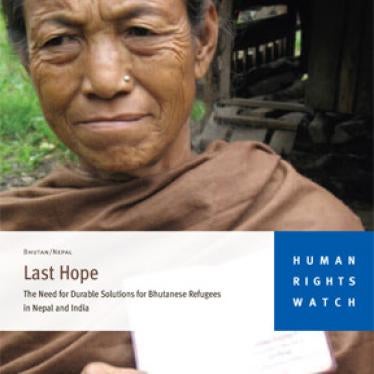(New York and Geneva) - The Nepali government should quickly implement the Supreme Court’s recent order to establish a Commission of Inquiry to investigate the thousands of enforced disappearances in Nepal’s civil conflict, Human Rights Watch and the International Commission of Jurists said today.
On June 1, the Supreme Court ruled on a large number of enforced disappearance cases, including 80 habeas corpus writs, and ordered the government to immediately investigate all allegations of enforced disappearances. The court ordered that this Commission of Inquiry must comply with international human standards.
“Nepal’s new government has promised to find the truth and ensure justice for ‘disappearances,’ but has been slow to make good on these pledges,” said Brad Adams, Asia director at Human Rights Watch. “Implementing the Supreme Court’s order on ‘disappearances’ will be a key test of the Nepali government’s commitment to establishing accountability and the rule of law.”
Human Rights Watch and the International Commission of Jurists welcomed the comprehensive Supreme Court decision.
“Through this decision, Nepal’s Supreme Court has demonstrated the important role any judiciary can play in upholding respect for the rule of law and international human rights principles, even in a country just emerging from conflict,” said Wilder Tayler, deputy secretary-general of the International Commission of Jurists. “This decision should be a source of inspiration to other judiciaries in the world as they struggle to deal with cases involving enforced disappearances.”
The Supreme Court also ordered the government to prosecute those responsible for the death in custody of Chakra Bahadur Katuwal. Katuwal was transferred to army barracks following one day of detention in Okhaldhunga District police station. On the same day he was transferred to the army barracks he was returned to the police station showing severe signs of torture. He died later that day. When his family enquired about his whereabouts, they were told he had been transferred to another district.
The Supreme Court also ordered that while the investigations take place the government should take administrative action against members of the security forces under investigation for involvement in Katuwal’s death. The order requires the administrative action to be in line with the report of the Detainees Investigation Task Force formed by the Supreme Court, which recommended suspensions of those under investigation for enforced disappearances.
The court ordered the government to provide interim relief to the families of the victims of the “disappeared,” which is to be provided without any effect on the final outcome of these cases. The court also ordered the government to enact legislation that would criminalise enforced disappearances and take into account the new International Convention for the Protection of all Persons from Enforced Disappearance.
Thousands of individuals were reportedly “disappeared” during Nepal’s 10-year conflict. According to the United Nations Working Group on Enforced or Involuntary Disappearances, Nepal in 2003 and 2004 recorded the highest number of new cases of enforced disappearances in the world. Between May 2000 and January 13, 2007, the National Human Rights Commission of Nepal received 2,028 cases of enforced disappearance. The fate or whereabouts of over 600 of these people remains unknown.
The Nepali government’s failure to hold accountable even a single perpetrator of these enforced disappearances perpetuates the culture of impunity in Nepal. This contributes to the current failures of law and order in the country and could lead to gross human rights violations in the future.
“The government must address impunity for past human rights violations, especially enforced disappearances, in a meaningful way,” said Wilder Tayler. “Victims of human rights violations, their communities and wider civil society must be involved in decisions about establishing the truth, ensuring justice and providing reparations.”
Human Rights Watch and the International Commission of Jurists called on the Nepali government to:
- Propose a new law specifically on enforced disappearances, in line with the Supreme Court order, rather than amend the Civil Code, as the government currently proposes. Such legislation should take into account the International Convention for the Protection of all Persons from Enforced Disappearance and recommendations made by the UN Office of the High Commissioner for Human Rights, Amnesty International and the International Commission of Jurists;
- Form a ministerial-led taskforce from the Ministry of Law, Justice and Parliamentary Affairs and the Ministry of Peace and Reconstruction to take responsibility for action on relevant parts of the Supreme Court order;
- Provide the families of the 84 victims with the interim relief as ordered by the Supreme Court;
- Initiate a criminal investigation into the death in custody of Chakra Bhadur Katuwal and prosecute those found responsible for or involved in his death;
- Suspend those identified by the Supreme Court as responsible for the death of Chakra Bhadur Katuwal and other “disappearances.”
Human Rights Watch and the International Commission of Jurists called on the Nepali government to take immediate steps to implement the order of the Supreme Court.
“Nepal’s government needs to end its foot-dragging on impunity for human rights violations by enforcing this order quickly and comprehensively,” said Brad Adams. “We’ll soon see if the government is serious about protecting its own citizens.”







